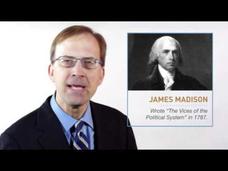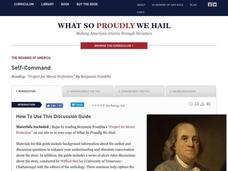Bill of Rights Institute
The Gilded Age, Robber Barons and the Rise of Big Business
Survival of the fittest! Scholars investigate an AP review video to discover the era of big business during the Gilded Age. Viewers examine the place of Robber Barons in society and its impact on the workforce in America. This is the...
Bill of Rights Institute
Interstate Commerce and the Constitution
Who had power over trade in the early days of the United States? Who has power now? Viewers investigate the Commerce Clause of the United States Constitution. Using an AP Exam review video, learners examine issues surrounding authority...
Administrative Office of the US Courts
Nomination Process
"I do solemnly swear that I will support and defend the Constitution of the United States..." Scholars investigate the nomination process of Supreme Court justices when assuming office. Through examination of primary and secondary...
Administrative Office of the US Courts
Hazelwood v. Kuhlmeier
Freedom of speech is not always free. Scholars investigate how the First Amendment provides for the right to express opinions. Through the court case Hazelwood v. Kuhlmeier, they analyze free speech using primary documents—and hopefully...
National Endowment for the Humanities
James Madison: Raising an Army—Balancing the States and the Federal Government
To war! To war! Every nation in the history of the world has had to deal with warfare on some level. Scholars go through a series of activities and discussions surrounding the development of the Constitution to help them better...
National Endowment for the Humanities
Lesson 2 James Madison: The Second National Bank—Powers Not Specified in the Constitution
How much power is too much power for the federal government? Scholars use primary documents and constitutional research in groups to analyze the creation of the Second National Bank under James Madison. This is the second lesson of a...
Bill of Rights Institute
Economics of the North and South Before the Civil War
How did economic issues lead to war? Viewers watch an AP review video to examine one of the main causes of the American Civil War, the Tariff of Abominations. They examine the issues concerning the economies of the North and South prior...
University of Virginia
Uncle Tom's Cabin: Reading the Novel
Teach the importance of context and perspective with a unit focused on Harriet Beecher Stowe's Uncle Tom's Cabin. The first lesson considers the role of female characters and readers, including the gender expectations of the time. The...
University of Virginia
Uncle Tom's Cabin: Starting Out
Prior knowledge is key when starting any novel unit, but it's essential before introducing Uncle Tom's Cabin by Harriet Beecher Stowe. Three lessons provide primary documents, historical discussions, and extended reading activities that...
University of Virginia
The Songs in Uncle Tom's Cabin
Experience Harriet Beecher Stowe's Uncle Tom's Cabin in an innovative, musical way. A list of audio links leads class members to spirituals from the novel, such as "Die in the Field," "The Wings in the Morning," and "Blow Ye the Trumpet."
Centers for Disease Control and Prevention
Tobacco Use and Secondhand Smoke Exposure Is High in Multiunit Housing
Much has been written recently about the danger of secondhand smoke. Laws have been passed to limit that exposure in offices, transportation centers, and public areas. But what about apartment buildings, condos, public housing, and other...
University of Virginia
Illustrating Uncle Tom's Cabin
Historical illustrations reveal more than what they are meant to portray. After reading Harriet Beecher Stowe's Uncle Tom's Cabin, high schoolers view a series of illustrations, movie posters, photographs, and book covers that exemplify...
Gilder Lehrman Institute of American History
Harriet Beecher Stowe Sends Uncle Tom’s Cabin to Victoria and Albert, 1852
Harriet Beecher Stowe's plea for abolition is not only laid plain in her acclaimed novel, Uncle Tom's Cabin, but in her written correspondence as well. High schoolers read a letter written by Stowe to Prince Albert and Queen Victoria to...
PBS
Lessons in Leadership, Roosevelt Style
It's easy to criticize those in power until you're sitting at their desk, faced with the same decisions. A history lesson plan prompts secondary learners to research the Roosevelt presidencies through the lens of leadership and...
Library of Congress
Thomas Jefferson's Library: Making the Case for a National Library
The United States Library of Congress, the largest library in the world. But such was not always the case. The library was destroyed during the War of 1812. In a persuasive letter to Samuel H. Smith, Thomas Jefferson offered to sell his...
Mr. Beem's Social Studies
Civil Rights Project: The Long Civil Rights Movement
Investigate milestones along the path that lead to the American Civil Rights Movement of the 1960s. After researching key people, events, court cases, and legislative orders, teams present their findings as a magazine, newspaper, or...
PBS
Evolution of the Presidency: Theodore Roosevelt to Franklin D. Roosevelt
How much power should a president be allowed to exert? Theodore Roosevelt and Franklin D. Roosevelt exercised their power according to their interpretations of the United States Constitution, and these interpretations affected the...
PBS
The Roosevelts: An Intimate History—Snapshot Lessons
The Roosevelt family was one of the most influential and prominent political forces in the 20th century, leaving behind a wide-ranging legacy of conservation, progressivism, and economic growth. Learn more about President Theodore...
Theodore Roosevelt Association
Defining America's Role in the World
As the first American president to win the Nobel Peace Prize, and only one of four presidents to do so in United States history, Theodore Roosevelt's foreign policy achievements and preservation of peace are often overshadowed by his...
Theodore Roosevelt Association
Roosevelt's Legacy: Conservation
The legacy of Theodore Roosevelt carries through modern American politics, economics, foreign policy, and society. But his proudest and most profound efforts were in the world of conservation, and in preserving the natural beauty of...
Theodore Roosevelt Association
Interpreting the Past; Assessing Its Impact on the Present
Even though the presidency of Theodore Roosevelt ended over 100 years ago, we can still learn something from his stances and policies that is applicable today. Class members first look over a list of prevalent political issues from the...
Theodore Roosevelt Association
Theodore Roosevelt: A Presidential Timeline
Throughout his life and presidency, Theodore Roosevelt contributed to the America we know today in so many ways. An adaptable lesson plan prompts young historians to create a chronological timeline of Roosevelt's contributions to...
What So Proudly We Hail
The Meaning of America: Self-Command
Even for one of the most accomplished men in American history, there was room for improvement. Challenge high schoolers to use Benjamin Franklin's Project for Moral Perfection to analyze text, make inferences, connect to historical...
Candace Fleming
Ben Franklin’s Almanac: Being a True Account of the Good Gentleman’s Life
Candace Fleming's award winning Ben Franklin's Almanac is the anchor text for a classroom guide that provides teachers with a cache of pre, during, and post-reading activities.

























